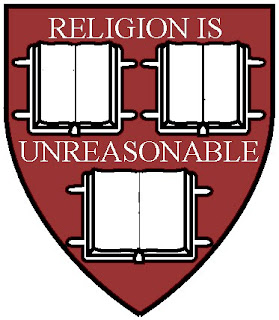Just got the latest issue of Newsweek in the mail today. And, behold, there's this very interesting article on Harvard University's trouble with religion in the curriculum. (Lisa Miller, "Harvard’s Crisis of Faith,"
 Newsweek, February 11, 2010.) So while the Texas board of education is intent on getting the word out to students that the founders were born-again believers, many of Harvard's cultured-despiser profs would rather their students spend more time learning about anything but religion. (I exaggerate.)
Newsweek, February 11, 2010.) So while the Texas board of education is intent on getting the word out to students that the founders were born-again believers, many of Harvard's cultured-despiser profs would rather their students spend more time learning about anything but religion. (I exaggerate.)Miller discusses a 2006 proposal floated by Louis Menand "that undergraduate students should be required to take at least one course in a category called Reason and Faith." Harvard's evolutionary psychologist Steven Pinker, and a host of others, said no thanks.
Miller observes that for Pinker:
human progress is an evolution away from superstition, witchcraft, and idol worship—that is, religion—and toward something like a Scandinavian austerity and secularism. (Pinker is one of those intellectuals who speak frequently about how sensible things are in Europe; one suppresses the urge to remind him of the Muslim riots in the Paris and London suburbs.) A university education is our greatest weapon in the battle against our natural stupidity, he said in a recent speech. "We don't kill virgins on an altar, because we know that it would not, in fact, propitiate an angry god and alleviate misfortune on earth."
In Miller's opinion such views haven't served the students all that well. "To decline to grapple head-on with the role of religion in a liberal-arts education," she argues, "even as debates over faith and reason rage on blogs, and as publishers churn out books defending and attacking religious belief, is at best timid and at worst self-defeating. . . . it's fair to say that the study of religion at Harvard is uniquely dysfunctional."
Miller speaks to faculty at Harvard--Peter Gomes and Diana Eck among them--and interviews Robert Orsi, Jeanne Kilde, a collection of others.
"Just because the study of religion does not fit into the narrow categories the university has created for itself," contends Miller, "does not mean that students should not equip themselves—in a rational, secular context—with a vocabulary for thinking about it."
A very intriguing piece, made all the more relevant by the recent buzz about the increasing number of historians who are working on religion.
Tidak ada komentar:
Posting Komentar